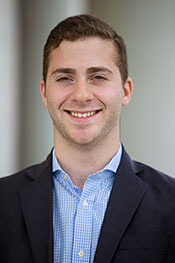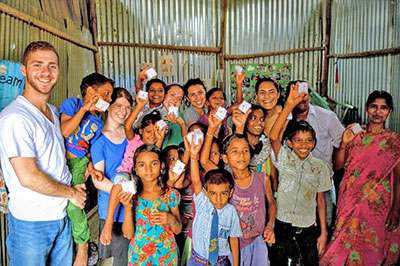

Connecting with People through Care
Hayeem Rudy: Aiming for Humanity in Healthcare
Although Hayeem Rudy had a strong affinity for his high-school science courses, the thought of becoming a physician was not in the front of his mind. He first realized he might be interested in medicine during orientation day at Brooklyn College.

Medical student Hayeem Rudy“Like a lot of other scientifically-inclined students, I was looking for a way to wed my love for science and society. I attended a pre-med overview during my college orientation, and decided to go for it but to keep my options open,” he recalled. “I still wasn’t fully convinced.”
He was more certain about his sociable nature. “I love interacting with people, but I knew that dealing with people in medicine would be different.” he said.
So he mapped out a plan: “Over the next three years, I purposely placed myself in positions to test whether or not dealing with people in a healthcare context was right for me.”
Following a summer-long trip to Jerusalem, where he volunteered as an emergency medical technician, and two years interacting with heart disease patients as a researcher volunteer at New York University, he applied to medical school and was admitted to Einstein. “The human aspect of those experiences confirmed that I was ready to passionately immerse myself in a career in medicine,” he said.
Creative Teaching
Last summer, before entering Einstein, Mr. Rudy traveled to Mumbai’s Kalwa slum via a fellowship from the Gabriel Project Mumbai, a non-governmental organization that sends young Jewish professionals and college students to India to participate in hunger-reduction and education programs. The program runs several classrooms in Kalwa to supplement the education provided by government schools in the area. Among the subjects Mr. Rudy and his fellow student teachers had the opportunity to teach the youngsters was health and hygiene.

Mr. Rudy with children and colleagues at Gabriel Project Mumbai, in India“One day, we were teaching a class on germs and hand-washing,” said Mr. Rudy. “When we asked the students about the times that they washed up, we discovered a major gap in their knowledge despite the fact that they had previously been taught about hand-washing. We learned that many of them didn’t wash after using the bathroom or before they handled their baby siblings.”
He continued, “Our team determined that we should address the various aspects of hand-washing with the children in a more vivid and dynamic way.”
To show the children how germs spread, he and the other teachers used flour to represent germs. First, they put flour on the hands of one teacher, and asked a student in the class to come and greet the teacher with handshakes and a hug. That student was then asked to hug and shake hands with another student. Soon, the class was bubbling with hand-shaking and hugging activity.
“Everyone could see the ‘germs’ being transmitted from one student to the next,” explained Mr. Rudy. “Then we had the students wash off the flour off with soap and water and continue to greet each other.” He smiled then, recalling what came next. “The sneezing-and-coughing demonstration was even more dramatic, generating billowing clouds of flour. I think it’s a lesson they won’t soon forget.”
Lessons in Return
In reflecting on his experience in India, Mr. Rudy said, “I went to India looking to teach, but came away with a sense that I learned lessons more valuable than those I was able to contribute.”
He explained, “The fellowship showed me that those who live in a slum, the ultimate example of poverty by Western standards, don’t want to be seen as objects of misery and poor circumstance. The lively spirit of the people of Kalwa and the vibrancy of their community made my time there remarkable. It helped me to develop a perspective that informs the way I approach my interactions with all people, regardless of their economic status.”
Does he now see himself as an educator? “Everybody has the potential to educate,” he said. “But I do feel I have a responsibility to share the lessons that I’ve been privileged to learn by participating in programs such as the Gabriel Project Mumbai.”
This summer, he hopes to do just that, possibly returning to India or by taking part in another educational opportunity.
“I’m excited to share my knowledge, and to continue to grow and learn,” he said. He also looks forward to beginning his medical research project at Einstein, where he intends to address racial and ethnic disparities in surgical care.
Posted on: Monday, June 27, 2016

Tablet Blog